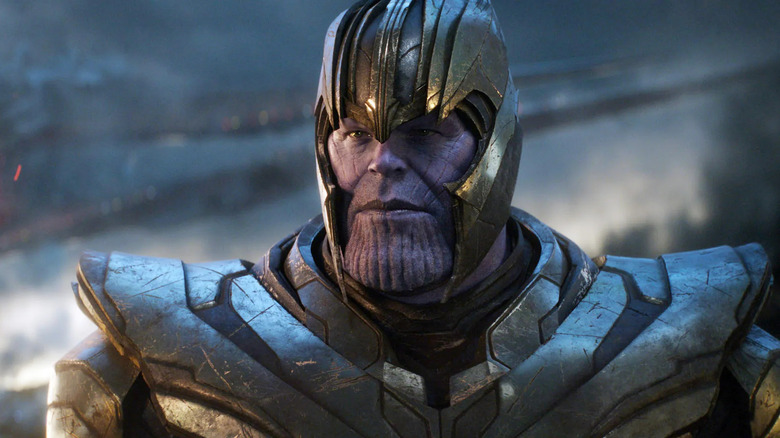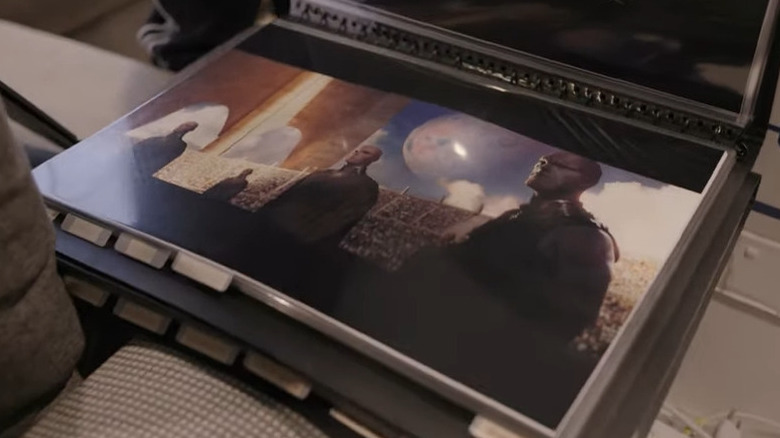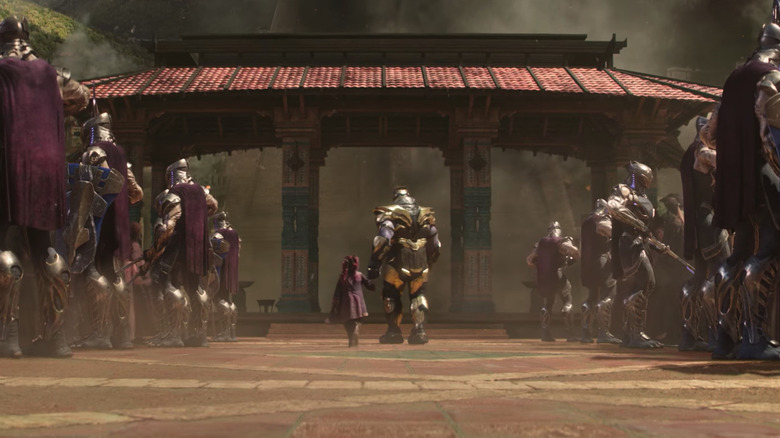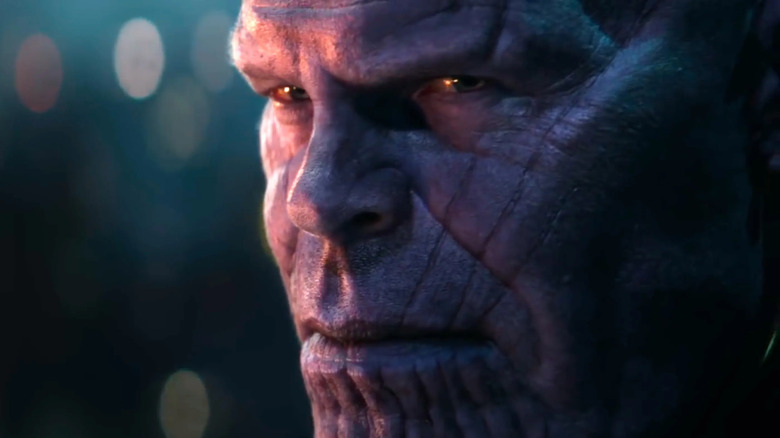Avengers: Infinity War Cut Out Several Flashbacks With A Young Thanos
Jim Starlin created the character Thanos in 1973 to serve as an ultra-powerful alien threat to multiple heroes in the pages of Marvel Comics. In the world of the comics, Thanos was often described as a nihilist — in the philosophical sense — who was deeply in love with Death (in Marvel Comics, Death is a physical, corporeal entity). In wanting to woo Death, Thanos gathered up the powerful Infinity Gems (called Stones in the MCU) and magically wiped out half the universe in an instant. Death was unimpressed. The themes of "The Infinity Gauntlet" was to tantalizingly ponder what would happen if a Goth kid — someone who talks only of death and negativity — got what they wanted.
Thanos learns the hard way that, for thanatophiles, Death won't love you back.
In the annals of the MCU, Thanos, while looking similar, was altered drastically. The Thanos of the MCU was not a nihilist, but a military despot — a war-ready solider, like the Avengers — whose ultimate concern was overpopulation and the misallocation of resources throughout the universe. His plan to gather the Infinity Stones and wipe out half the universe's population was ultimately motivated by environmentalist concerns. One might have hoped for a scene a hero explained to Thanos that the Infinity Stones could have been used to reallocate resources, or perhaps provide more food and space for all living beings, but the tragedy of both Thanos and the Avengers is they aren't imaginative enough to think of any solutions that don't involve battlefield shenanigans.
A new question arises, then. What made the MCU version of Thanos come to the solutions he did? It turns out, those questions may have been answered in a Thanos backstory that went unfilmed.
Thanos backstory
On July 18, 2022 — as a tie-in for their film "The Gray Man" — Netflix released an exclusive behind-the-scenes video of the offices of directors Anthony and Joe Russo, who also directed "Avengers: Infinity War" and "Avengers: Endgame," the two MCU films that dealt most closely with Thanos as a villain. The Russos playfully led a camera crew through their hallways, pointed out some of the unusual items they have laying around — they don't know why there is a leather weightlifter's belt in their office — as well as a professionally bound booklet of "key frames" used for "Infinity War." As they idly flip through the key frames, containing what appears to be photographs or concept art, used to denote color and lighting in their movie, they land on a picture of four people of Thanos' species standing in an arena. Fans of the movie will recognize that this was a scene not included in "Infinity War."
The Russos point out that it was from an excised sequence that would go into Thanos' backstory. Joe was quick to point out that the sequence was never filmed, seemingly wanting to curtail any rumors about possible missing footage from "Infinity War."
This was the first visual of a backstory that "Infinity War" screenwriters Christopher Markus and Stephen McFeely had previously described — generally — in a 2018 interview on /Film. Their original vision for "Infinity" was to stage it, at least partially, as a Thanos origin story. In that interview, the screenwriters knew that Thanos had to be more interesting than some of the villains that preceded him in the MCU, so they, in their words invented him as "an amoral philosopher."
The backstory
In an interview with Backstory Magazine, related to ComicBook.com, Markus and McFeely elucidated further on some of their original ideas. There was to be, by their account, a scene in "Infinity War" that depicted Thanos as a young man, attempting to argue his case about the dwindling of natural resources in front of a panel of politicians.
"We wrote some scenes, sort of flashbacky scenes of a young Thanos on Titan trying to make his case ... And part of the reason it went away is it got a little too Jor-El on Krypton making his case, you know? It was the sort of thing you could imply without having to see."
Jor-El and Krypton are, of course, features of Superman comics. Perhaps inviting comparison to DC wasn't wise, since, 1. That story had been told, and 2. Thanos creator Starlin modeled Thanos off of a DC Comics character named Darkseid.
Markus and McFeely decided that they did want flashbacks, but more as they pertained to Thanos' relationship with the character Gamora (Zoe Saldaña) whom he raised as a daughter and would kill partway through the movie (don't worry, though; death is impermanent in the MCU). There are scenes in "Infinity War" featuring Gamora as a young girl first being kidnapped by Thanos and raised to believe in his militant thinking. Said McFeely of the shift in focus:
"What we settled on were all those scenes that explained any history he had with Gamora. Those are doing more than one thing, because they're highlighting his relationship with the daughter he's going to have to sacrifice."
The gangster movie
Another early iteration of the script — as detailed again in ComicBook.com, transcribing a Backstory Magazine interview — the Russos described a version of "Infinity War" as a gangster movie told entirely from Thanos' perspective, featuring a constant narration. Think perhaps of "GoodFellas." Joe Russo described it thus:
"There was one where Thanos narrated the whole movie, and it sort of had the tone of a gangster film, where you've got this heavy narration from his point of view. It was an interesting experiment, taught us a lot about him as a character, but it ultimately didn't work as a movie structurally. The narration was repetitive, but it led us to the sort of smash-and-grab structure we ultimately used."
The narration-from-the-villain would certainly have been innovative, and would have made "Infinity War" quite unlike any of the other films in the MCU — few of the MCU movies feature a voiceover — but it may have interrupted the constant forward momentum of "Infinity War." To recall, "Infinity War" plays out like an extended chase sequence wherein Thanos — with dozens of superheroes on his trail — gathers the Infinity Stones one by one, making him more powerful each time. The film ends with his killing of half the universe, the inaugural event of the comics.
Perhaps "The Adventures of Young Thanos" is still forthcoming as a Disney+ series. Perhaps a scene of young Thanos would have made "Infinity War" better, crucially expanding it. At any rate, the version of "Infinity War" audiences saw was satisfying enough to garner a great deal of money at the box office, and carry the MCU to one of the most watched movies of all time. One might suppose certain decisions were made correctly.



